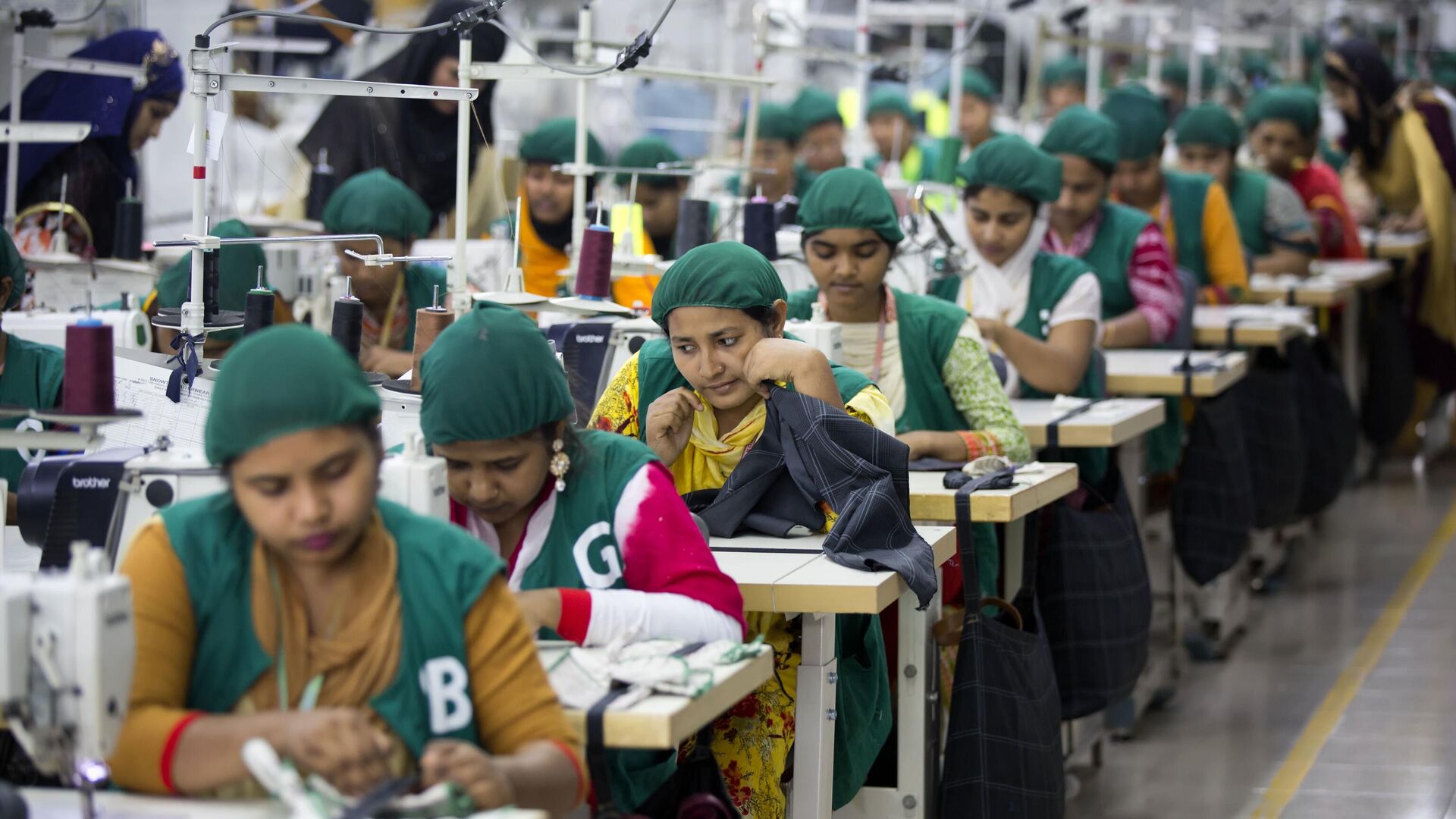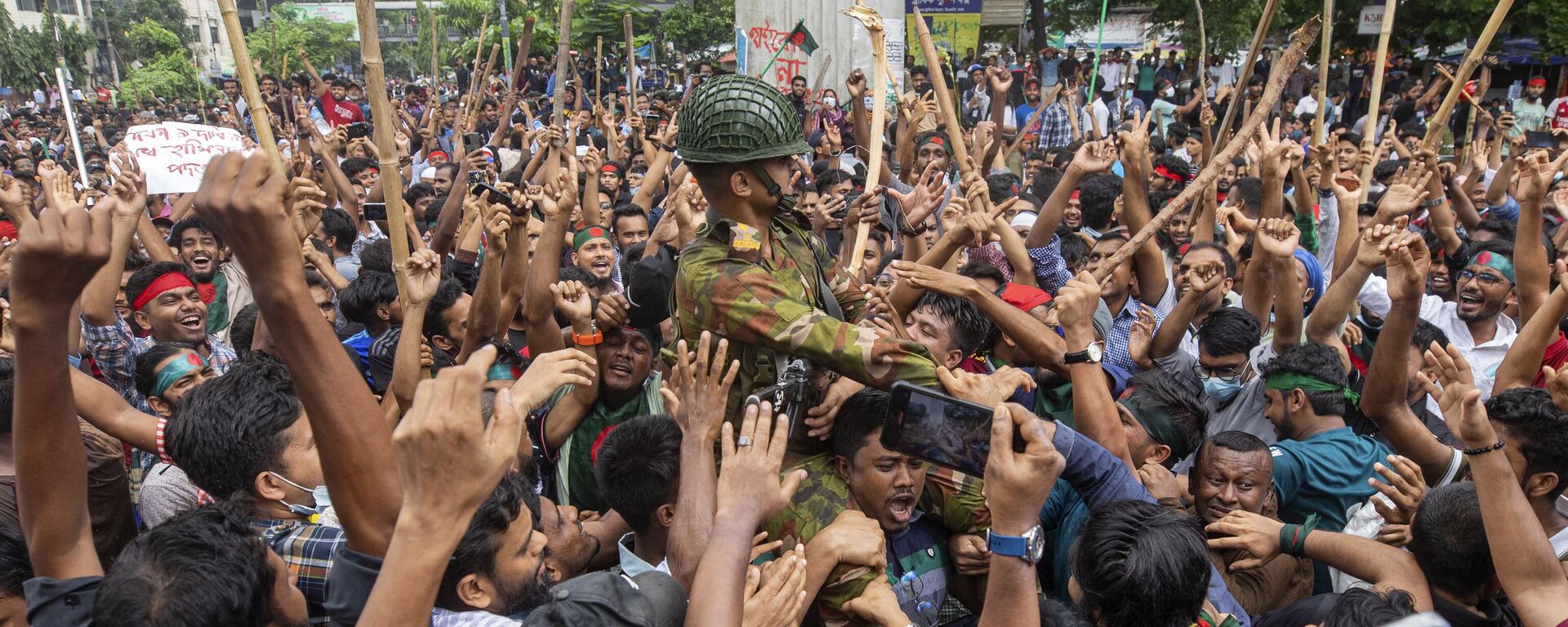https://sputniknews.in/20240820/bangladesh-unrest-poses-risk-to-global-garment-industry-8031335.html
Bangladesh Unrest Poses Risk To Global Garment Industry
Bangladesh Unrest Poses Risk To Global Garment Industry
Sputnik India
The interim Bangladeshi government must improve domestic air and sea shipping infrastructure to boost investor confidence — or its role as a global garment hub... 20.08.2024, Sputnik India
2024-08-20T00:36+0530
2024-08-20T00:36+0530
2024-08-20T00:36+0530
bangladesh
dhaka
india
government of india
bangladesh nationalist party
ministry of external affairs (mea)
trade corridor
free trade agreement (fta)
sea trade
world trade organization (wto)
https://cdn1.img.sputniknews.in/img/07e8/08/13/8031657_0:0:3072:1728_1920x0_80_0_0_0a99d063b1d9787c778dbcfe297d3b88.jpg
Bangladesh will not allow disruption of the global garment supply chain.That is according to Muhammad Yunus, head of Bangladesh’s interim government, at a diplomatic meeting in Dhaka.Bangladesh’s textile industry, the world’s second-largest clothing exporter after China, boasts 3,500 factories and over 4 million workers producing apparel for major global brands.De noted that Bangladesh’s status as the world’s second-largest exporter is due to its skilled workforce and trade concessions, such as the Generalized System of Preferences Plus (GSP+) from developed countries.The GSP+ allows Bangladesh to export garments to developed states duty-free, allowing it to produce garments in bulk, he pointed out.De said global standards and training from international companies have empowered Bangladesh to meet diverse quality and design requirements, ensuring its success in this labor-intensive sector.Small entrepreneurs in Bangladesh supply international brands like H&M with cotton and synthetic shirts, making Bangladesh a key source for these garments, he said.Bangladesh's exports during the pandemic increased due to its capacity to supply uniforms for doctors, nurses, and health workers, showcasing its strong supply chain advantages, the pundit said.Currently, both Dhaka airport and the port of Chattogram are overcrowded, with the seaport suffering from siltation, De explained.Matarbari, a new port facility, is under construction near Cox's Bazar. The small Dhaka airport struggles to accommodate larger cargo aircraft, the expert said.He said the Bangladeshi government faces a dual challenge: first, restoring law and order, encouraging people to return to work, and secondly solving Bangladesh’s supply chain issues which have led to inventory pile-ups and unmet orders.“This situation presents an opportunity for neighbouring countries like India and Sri Lanka, but global companies may face significant losses until they can transition away from Bangladesh”, De said.The expert argued that global markets should allow Bangladesh’s new caretaker government some time to address law and order and make critical economic decisions amid ongoing unrest and poor economic conditions.He pointed out that Bangladesh is set to transition from Least Developed Country to developing country status on January 1, 2026, which usually means losing trade concessions.However, the US and European have promised to phase out concessions gradually, giving Bangladesh time until December 31 2030, to improve its infrastructure, he said.
https://sputniknews.in/20240819/bangladesh-a-us-coup-with-profound-geopolitical-repercussions--oped-8028990.html
bangladesh
dhaka
india
Sputnik India
feedback.hindi@sputniknews.com
+74956456601
MIA „Rossiya Segodnya“
2024
Swapna Nair
https://cdn1.img.sputniknews.in/img/07e7/09/12/4320104_0:0:681:681_100x100_80_0_0_ca8a7d4d582609272840ffdd1cde7278.jpg
Swapna Nair
https://cdn1.img.sputniknews.in/img/07e7/09/12/4320104_0:0:681:681_100x100_80_0_0_ca8a7d4d582609272840ffdd1cde7278.jpg
News
en_IN
Sputnik India
feedback.hindi@sputniknews.com
+74956456601
MIA „Rossiya Segodnya“
Sputnik India
feedback.hindi@sputniknews.com
+74956456601
MIA „Rossiya Segodnya“
Swapna Nair
https://cdn1.img.sputniknews.in/img/07e7/09/12/4320104_0:0:681:681_100x100_80_0_0_ca8a7d4d582609272840ffdd1cde7278.jpg
bangladesh, disruptions, global supply chain, ready-made garments, muhammad yunus, head of bangladesh’s interim government, dhaka, bangladesh’s textile industry, second-largest clothing exporter, china, global brands, bangladesh, skilled workforce, garment manufacturing, korean training programs, dr. prabir de, professor , research and information system for developing countries (ris), bangladesh, second-largest exporter, skilled workforce and trade concessions, generalized system of preferences , generalized system of preferences (gsp+), bangladesh, duty-free, quality and design requirements, labor-intensive sector, international brands, h&m, cotton and synthetic shirts, zara and marks & spencer, walmart, budget garments, bangladesh, u.s., covid, bangladesh's exports, supply uniforms for doctors, nurses, and health workers, supply chain advantages, dhaka airport and chattogram port, seaport, port facility, matarbari, cox's bazar, dhaka airport,cargo aircraft, bangladesh’s outdated infrastructure, ongoing political issues, law and order, bangladesh’s supply chain issues, india and sri lanka, global companies bangladesh, bangladesh’s new caretaker government, law and order, economic decision, unrest and poor economic conditions, interim government, investor confidence, domestic infrastructure for air and sea shipping, least developed country, developing country, trade concessions, bangladesh time until december 31, 2030, infrastructure, current geopolitical situation, global trade supplier
bangladesh, disruptions, global supply chain, ready-made garments, muhammad yunus, head of bangladesh’s interim government, dhaka, bangladesh’s textile industry, second-largest clothing exporter, china, global brands, bangladesh, skilled workforce, garment manufacturing, korean training programs, dr. prabir de, professor , research and information system for developing countries (ris), bangladesh, second-largest exporter, skilled workforce and trade concessions, generalized system of preferences , generalized system of preferences (gsp+), bangladesh, duty-free, quality and design requirements, labor-intensive sector, international brands, h&m, cotton and synthetic shirts, zara and marks & spencer, walmart, budget garments, bangladesh, u.s., covid, bangladesh's exports, supply uniforms for doctors, nurses, and health workers, supply chain advantages, dhaka airport and chattogram port, seaport, port facility, matarbari, cox's bazar, dhaka airport,cargo aircraft, bangladesh’s outdated infrastructure, ongoing political issues, law and order, bangladesh’s supply chain issues, india and sri lanka, global companies bangladesh, bangladesh’s new caretaker government, law and order, economic decision, unrest and poor economic conditions, interim government, investor confidence, domestic infrastructure for air and sea shipping, least developed country, developing country, trade concessions, bangladesh time until december 31, 2030, infrastructure, current geopolitical situation, global trade supplier
Bangladesh will not allow disruption of the global garment supply chain.
That is according to Muhammad Yunus, head of Bangladesh’s interim government, at a diplomatic meeting in Dhaka.
Bangladesh’s textile industry, the world’s second-largest clothing exporter after China, boasts 3,500 factories and over 4 million workers producing apparel for major global brands.
“Bangladesh’s key advantage is its highly skilled workforce in garment manufacturing, a development that began with Korean training programs 30-40 years ago,” Dr Prabir De, professor at Research and Information System for Developing Countries (RIS), told Sputnik India.
De noted that Bangladesh’s status as the world’s second-largest exporter is due to its skilled workforce and trade concessions, such as the Generalized System of Preferences Plus (GSP+) from developed countries.
The GSP+ allows Bangladesh to export garments to developed states duty-free, allowing it to produce garments in bulk, he pointed out.
De said global standards and training from international companies have empowered Bangladesh to meet diverse quality and design requirements, ensuring its success in this labor-intensive sector.
Small entrepreneurs in Bangladesh supply international brands like H&M with cotton and synthetic shirts, making Bangladesh a key source for these garments, he said.
Similarly, De highlighted that brands like Zara and Marks & Spencer, as well as Walmart, source most of their budget garments from Bangladesh, especially as global exports to the US declined during the COVID-19 pandemic.
Bangladesh's exports during the pandemic increased due to its capacity to supply uniforms for doctors, nurses, and health workers, showcasing its strong supply chain advantages, the pundit said.
Currently, both Dhaka airport and the port of Chattogram are overcrowded, with the seaport suffering from siltation, De explained.
Matarbari, a new port facility, is under construction near Cox's Bazar. The small Dhaka airport struggles to accommodate larger cargo aircraft, the expert said.
“Bangladesh’s outdated infrastructure and ongoing political issues could drive international buyers to move their business elsewhere if the crisis continues,” De warned.
He said the Bangladeshi government faces a dual challenge: first, restoring law and order, encouraging people to return to work, and secondly solving Bangladesh’s supply chain issues which have led to inventory pile-ups and unmet orders.
“This situation presents an opportunity for neighbouring countries like India and Sri Lanka, but global companies may face significant losses until they can transition away from Bangladesh”, De said.
The expert argued that global markets should allow
Bangladesh’s new caretaker government some time to address law and order and make critical economic decisions amid ongoing unrest and poor economic conditions.
“The interim government must make effective decisions to enhance investor confidence, however, if without improvements to its domestic infrastructure for air and sea shipping, Bangladesh’s role as a global garment hub could be severely impacted in the medium to long term,” De said.
He pointed out that Bangladesh is set to transition from Least Developed Country to developing country status on January 1, 2026, which usually means losing trade concessions.
However, the US and European have promised to phase out concessions gradually, giving Bangladesh time until December 31 2030, to improve its infrastructure, he said.
“Despite retaining trade concessions for now, Bangladesh may find it difficult to attract new investments due to the current geopolitical situation, with its status as a
global clothing exports trade supplier remaining uncertain,” De concluded.



